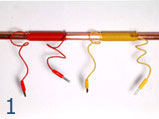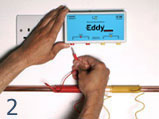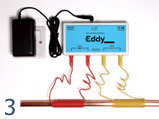Beat Limescale With Eddy
Why
you need a descaler?
Scale, or limescale is a hard, whitish coating that builds up
on surfaces that come into contact with hard water. Hard water
causes limescale because it contains calcium carbonate (lime)
and other minerals that stick to pipes and water heaters as water
is heated. The accumulated limescale inside water heaters reduces
their life and energy efficiency.
Water
from a groundwater source is usually harder because minerals drain
into it from the soil. Water from river sources is generally softer.
How
Limescale Forms
When mains water is heated, it causes the dissolved salts to attach
themselves to any metal they come into contact with, forming a
creamy-coloured hard crust called limescale or scale. It's a familiar
sight on the heating elements in electric kettles and other boilers.
In areas of the country where the water is naturally soft, the
build-up takes a longer time to be noticed. In hard water areas,
the limescale build-up can be relatively quicker.
An electronic
descaler such as Eddy will minimise the Cause of lime scale
formation.
Unlike most substances, most calcium salts become less soluble
as the temperature rises (commonly known as inverse solubility).
Such salts are naturally present to some degree in all mains
water supplies. Hence, any system where mains water is heated
is liable to suffer from limescale formation. Consider a mains
water containing 300 milligrams per litre (mg/l) of calcium
carbonate hardness. The potential weight of limescale produced
in a 100 litre central heating system is 30 grams, and this
is from only the initial fill of water. Once formed, calcium
scale tends to not redissolve, and water lost from the system
for whatever reason will leave it behind.
The fresh make-up water will then bring more calcium salts into
the system to begin the process again producing an ever-increasing
thickness of scale. Being a direct result of increased temperature,
limescale will form in the hottest part of the system, usually
the heat transfer surface in the boiler. In contrast, iron oxide
first forms as sludge at the point of corrosion, and only turns
into limescale if it is carried by the water to the heat exchanger
where it can become hardened by baking. You need a descaler.






